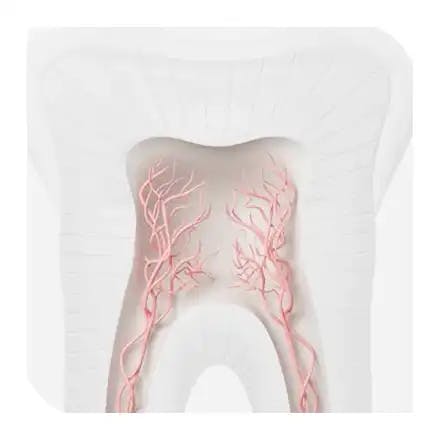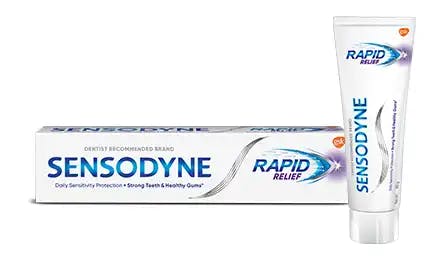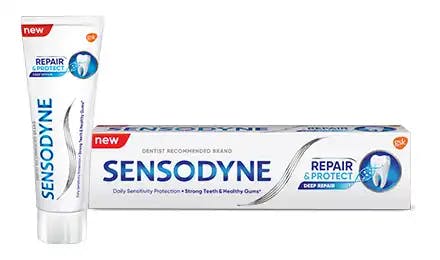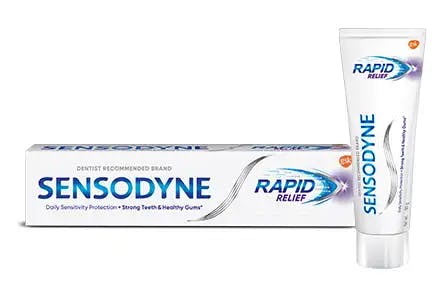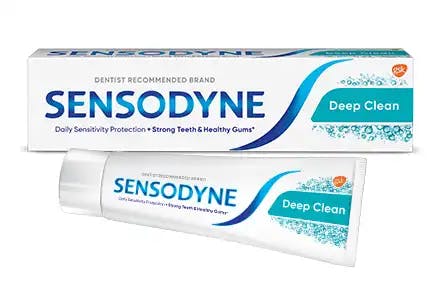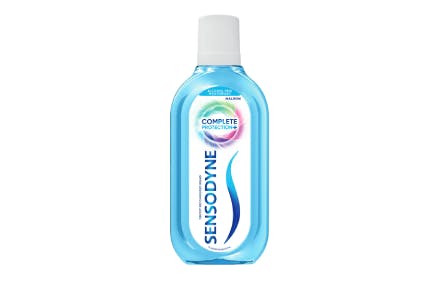Frequently Asked Questions
- All Topics
- Tooth Sensitivity
- Acid Erosion
- Sensodyne Toothpaste
- Sensodyne Toothbrush
Tooth sensitivity
-
What is tooth sensitivity?
Dentinal hypersensitivity, or tooth sensitivity, is a common dental problem that can arise when dentine, the inner part of the tooth, becomes exposed. It’s a condition that can develop over time, as a result of common problems such as receding gums and enamel wear.
Find out What Causes Sensitive Teeth
-
What causes tooth sensitivity?
Tooth sensitivity can start to happen when the softer, inner part of the tooth called ‘dentine’ becomes exposed. Dentine lies under the enamel and the gums. Thousands of microscopic channels run through the dentine towards the centre of the tooth. Once the dentine is exposed, external triggers (such as a cold drink) can stimulate the nerves inside the tooth, resulting in the characteristic short, sharp sensation of tooth sensitivity.
See What Causes Sensitive Teeth to find out more
-
How can I protect myself against sensitivity?
Talk to your dentist about the symptoms you are experiencing. They can confirm that tooth sensitivity is the cause of your problem and then advise you on how to care for sensitive teeth, for example, what is the best toothbrushing technique for you, how often and when. In addition, you can protect from tooth sensitivity by changing your regular toothpaste to a daily use toothpaste specially formulated to protect sensitive teeth, such as Sensodyne
See Ongoing Oral Care For Sensitive Teeth to find out more
-
What triggers sensitive teeth?
A range of things can trigger a sensation for people with sensitive teeth. Here’s some of the most common triggers for tooth sensitivity:
- Cold foods or beverages
- Hot foods or beverages
- Sugary foods
- Sour foods
- Breathing in cold air
- Brushing teeth
See Common Triggers of Sensitive Teeth to find out more.
-
Is tooth sensitivity a common dental problem?
-
Is tooth sensitivity a sign of a more serious dental problem?
There can be many different causes of dental sensation other than tooth sensitivity. So if you are feeling any sensation or discomfort, especially if it persists, the best thing you can do is visit your dentist and seek professional advice.
See Other Reasons for Sensitivity to find out more.
-
Can brushing too hard cause sensitive teeth?
Brushing overly aggressively or more frequently than your dentist recommends can contribute to gum recession and wear enamel. Over time, receding gums and enamel loss can lead to exposed dentine and tooth sensitivity.
Find out How to brush and ways to treat sensitive teeth.
Acid erosion
-
What is acid erosion?
The wearing away of enamel, caused by acid in our diet, is called "Acid Wear." As few as four acidic "occasions" throughout the day can put our enamel at risk from acid wear. If your tooth enamel is at risk of acid wear, ask your dentist about the issue, for dietary advice, how best to consume the many acidic foods and drinks in the modern diet and the best oral hygiene routine for you.
-
What causes acid erosion?
Over time, acidic foods and drinks can cause your teeth enamel to wear down. These include fruit and fruit juices, carbonated drinks, black coffee or tea, wine and anything that tastes sharp, like ketchup or salad dressing. To help protect your teeth against acid erosion, talk to your dentist and use a fluoride toothpaste specially developed for people at risk of acid wear. Ask your dentist for dietary advice on the best oral hygiene routine for you and how best to consume the many acidic foods and drinks in the modern diet.
-
Can acid erosion cause teeth sensitivity?
Sensitivity Toothpaste
-
How do desensitizing toothpastes work?
People with exposed dentine are susceptible to tooth sensitivity, triggered, for example, by cold drinks or hot food. Sensodyne formulas work in two different ways: Sensodyne toothpastes with potassium nitrate work to soothe the nerves inside the tooth. Sensodyne Repair & Protect with novamin builds a robust reparative layer over the exposed dentine to create a barrier. Each Sensodyne toothpaste, provides tooth sensitivity protection with twice daily brushing.
-
Does Sensodyne toothpaste come in different varient?
-
How often should I use Sensodyne toothpaste?
We would recommend using Sensodyne toothpaste twice a day, every day, for ongoing protection from tooth sensitivity. Ask your dentist for advice about the best oral hygiene routine for you.
-
Once I stop using Sensodyne toothpaste will my tooth sensitivity return?
Studies investigating the efficacy of potassium nitrate-containing sensitivity toothpastes have shown that the sensation of sensitive teeth begins to return when usage stopped.
Sensodyne toothpastes are daily use toothpastes, developed to help protect from dentinal hypersensitivity, when used as directed, twice a day, every day.
Please consult your dentist for advice about sensitive teeth, and the best oral hygiene routine and toothpaste for you.
Always read the label and follow the directions for us. Sensitive teeth may indicate an underlying problem that needs prompt care. If symptoms persist or worsen, see your dentist.
-
Why should children under 12 consult a dentist before using Sensodyne toothpaste?
Sensodyne toothpaste is not recommended for use by children under the age of 12. Sensitivity is rarely a problem in children that young. Check with your child's dentist for appropriate advice and recommendation.
-
Does Sensodyne toothpaste contain fluoride?
All Sensodyne toothpastes in India contain fluoride.
-
Does Sensodyne contain triclosan?
-
Is Sensodyne toothpaste available as a travel-sized tube?
-
Can I use mouthwash after brushing with Sensodyne toothpaste?
-
Is Sensodyne toothpaste safe to use during tooth-whitening treatments?
Dentinal hypersensitivity is a common condition of the teeth which can arise when the dentine of the tooth becomes exposed (typically as a result of gingival recession or tooth wear). The sensitivity which can be experienced during and after professional whitening procedures is different. In this case, the bleaching component is believed to penetrate the tooth, causing sensitivity.
Studies indicate that toothpastes containing potassium nitrate can reduce the sensitivity associated with professional whitening procedures. In these studies, subjects using Sensodyne with potassium nitrate for two weeks prior to, and during whitening treatment experienced less sensitivity post treatment, compared to those using a regular fluoride toothpaste.
Speak to your dentist about bleaching-related sensitivity if you are considering having a tooth whitening treatment. Use Sensodyne products as directed on the product label.
-
How is Sensodyne Repair & Protect toothpaste different from the other Sensodyne toothpaste?
Sensodyne Toothbrush
-
How do Sensodyne soft and extra soft toothbrush bristles compare with a regular soft-bristled toothbrush?
The Sensodyne Expert toothbrush is specially designed to gently clean teeth using silky bristles. The Sensodyne Sensitive Soft toothbrush features tapered bristles which provides even gentler cleaning. Both are suitable for use by people with sensitive teeth and are designed to gently clean the teeth, and be gentle on the gums.
-
What are the bristles made of?
-
Why is the Sensodyne toothbrush good for people with sensitive teeth?
Sensodyne toothbrushes have small angled heads, designed to provide effective cleaning, even in hard to reach areas. The soft toothbrush bristles have been specially designed to gently clean the teeth and be gentle on the gums. Ask your dentist for advice on the best oral hygiene routine and toothbrushing technique for you.
-
How often should one replace a toothbrush?
-
What is the benefit of using this brush over an electric toothbrush?
-
Can I use a Sensodyne toothbrush on my dentures?

